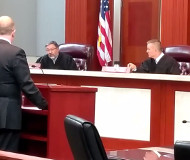10/6/2017
Utah Supreme Court Defends Multi-Space Parking MetersSalt Lake City absolved of responsibility after printing false and misleading information on its parking tickets.

Cities around the country have replaced traditional coin-fed parking meters with "pay and display" style electronic parking meter kiosks. The new devices increase the amount of revenue cities collect, but an attempt by a group of Utah motorists to stop their use in Salt Lake City failed last week before the state's highest court.
Local politicians have raced to install the multi-space meters because they encourage motorists to reserve the maximum amount of time available on their credit cards. When a driver leaves early, the time on the meter is zeroed out, effectively allowing the city to charge twice for the same parking spot.
A class action lawsuit argued that Salt Lake City installed the new parking kiosks without updating the parking ordinance, which made it a crime to park in a metered space without inserting coins. The new spaces do not have meters, as defined in the ordinance.
Despite the technical issue with the ordinance,. Salt Lake City's meter maids hand out parking tickets that are $15 if paid immediately, but rise to $125 if not paid within 31 days. Each ticket says motorists only have ten days to "see a hearing officer" to "discuss" challenging a ticket, even though the city code actually affords them twenty days to file. Motorists Timothy Bivens and Michelle Reed did call to challenge their tickets, but they were sent a notice saying they had to file in small claims court. Reed decided paying the $55 ticket was more cost effective than spending far more on legal fees. Bivens hired an attorney and won his case on a technicality unrelated to the due process challenge. The justices admitted the motorists brought up legitimate issues.
"We are troubled by the misleading statements on the parking ticket and in the small claims court information document," Justice Constandinos Himonas wrote for the court. "We share the plaintiffs' concern that the city's notices may have the effect of inducing payment of parking fines irrespective of whether a motorist has a good-faith basis for contesting those fines. This is not in keeping with norms of good governance."
The justices denied, however, that Salt Lake City's violations were bad enough to require shutting down the parking meters.
"Despite our concerns, we nonetheless affirm the district court's dismissal of the plaintiffs' procedural due process claim," Justice Himonas wrote for the court. "Not every failure of government rises to the level of a due process violation."
The court asserted that the tickets provided information that was good enough to let ticket recipients know that they could contest a citation, along with a phone number they could use to obtain more information. The court concluded it would only hear a parking ticket challenge if plaintiffs had gone through every step of the procedure to challenge the ticket.
"But a $15 parking fine is comparatively low stakes, and the plaintiffs have failed to state a claim that the notices here did not adequately apprise them of their right to a hearing on their objections," Justice Himonas concluded. "In our view, however, if the plaintiffs believed they were not legally required to pay to park, their proper recourse was to decline to pay and then challenge any ticket they received using the procedures outlined on the parking violation notice and in the small claims court information document."
A copy of the ruling is available in a 300k PDF file at the source link below.


